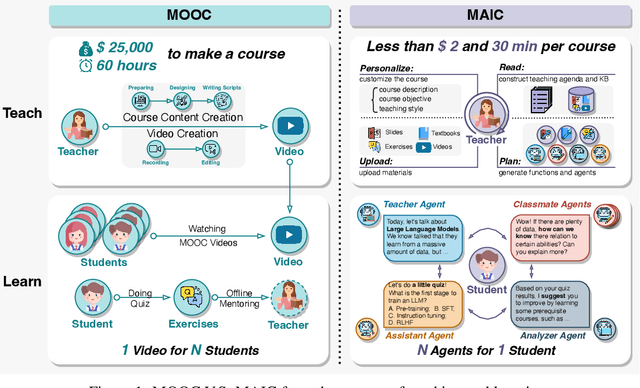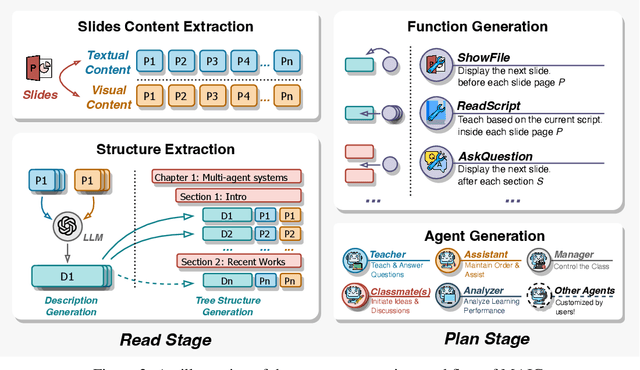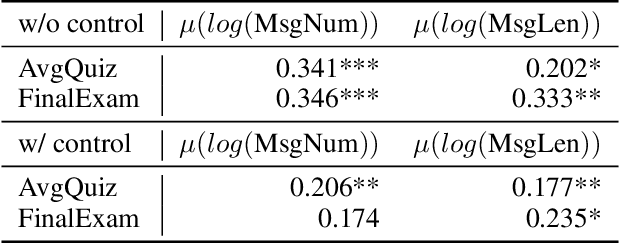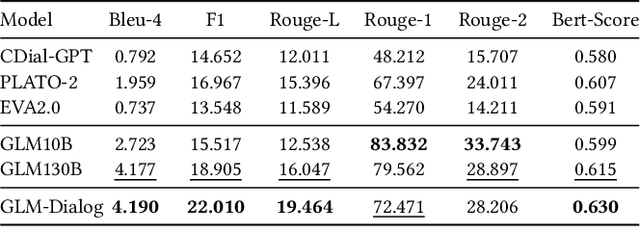Haohua Wang
Awaking the Slides: A Tuning-free and Knowledge-regulated AI Tutoring System via Language Model Coordination
Sep 11, 2024Abstract:The vast pre-existing slides serve as rich and important materials to carry lecture knowledge. However, effectively leveraging lecture slides to serve students is difficult due to the multi-modal nature of slide content and the heterogeneous teaching actions. We study the problem of discovering effective designs that convert a slide into an interactive lecture. We develop Slide2Lecture, a tuning-free and knowledge-regulated intelligent tutoring system that can (1) effectively convert an input lecture slide into a structured teaching agenda consisting of a set of heterogeneous teaching actions; (2) create and manage an interactive lecture that generates responsive interactions catering to student learning demands while regulating the interactions to follow teaching actions. Slide2Lecture contains a complete pipeline for learners to obtain an interactive classroom experience to learn the slide. For teachers and developers, Slide2Lecture enables customization to cater to personalized demands. The evaluation rated by annotators and students shows that Slide2Lecture is effective in outperforming the remaining implementation. Slide2Lecture's online deployment has made more than 200K interaction with students in the 3K lecture sessions. We open source Slide2Lecture's implementation in https://anonymous.4open.science/r/slide2lecture-4210/.
From MOOC to MAIC: Reshaping Online Teaching and Learning through LLM-driven Agents
Sep 05, 2024



Abstract:Since the first instances of online education, where courses were uploaded to accessible and shared online platforms, this form of scaling the dissemination of human knowledge to reach a broader audience has sparked extensive discussion and widespread adoption. Recognizing that personalized learning still holds significant potential for improvement, new AI technologies have been continuously integrated into this learning format, resulting in a variety of educational AI applications such as educational recommendation and intelligent tutoring. The emergence of intelligence in large language models (LLMs) has allowed for these educational enhancements to be built upon a unified foundational model, enabling deeper integration. In this context, we propose MAIC (Massive AI-empowered Course), a new form of online education that leverages LLM-driven multi-agent systems to construct an AI-augmented classroom, balancing scalability with adaptivity. Beyond exploring the conceptual framework and technical innovations, we conduct preliminary experiments at Tsinghua University, one of China's leading universities. Drawing from over 100,000 learning records of more than 500 students, we obtain a series of valuable observations and initial analyses. This project will continue to evolve, ultimately aiming to establish a comprehensive open platform that supports and unifies research, technology, and applications in exploring the possibilities of online education in the era of large model AI. We envision this platform as a collaborative hub, bringing together educators, researchers, and innovators to collectively explore the future of AI-driven online education.
GLM-Dialog: Noise-tolerant Pre-training for Knowledge-grounded Dialogue Generation
Feb 28, 2023



Abstract:We present GLM-Dialog, a large-scale language model (LLM) with 10B parameters capable of knowledge-grounded conversation in Chinese using a search engine to access the Internet knowledge. GLM-Dialog offers a series of applicable techniques for exploiting various external knowledge including both helpful and noisy knowledge, enabling the creation of robust knowledge-grounded dialogue LLMs with limited proper datasets. To evaluate the GLM-Dialog more fairly, we also propose a novel evaluation method to allow humans to converse with multiple deployed bots simultaneously and compare their performance implicitly instead of explicitly rating using multidimensional metrics.Comprehensive evaluations from automatic to human perspective demonstrate the advantages of GLM-Dialog comparing with existing open source Chinese dialogue models. We release both the model checkpoint and source code, and also deploy it as a WeChat application to interact with users. We offer our evaluation platform online in an effort to prompt the development of open source models and reliable dialogue evaluation systems. The additional easy-to-use toolkit that consists of short text entity linking, query generation, and helpful knowledge classification is also released to enable diverse applications. All the source code is available on Github.
 Add to Chrome
Add to Chrome Add to Firefox
Add to Firefox Add to Edge
Add to Edge